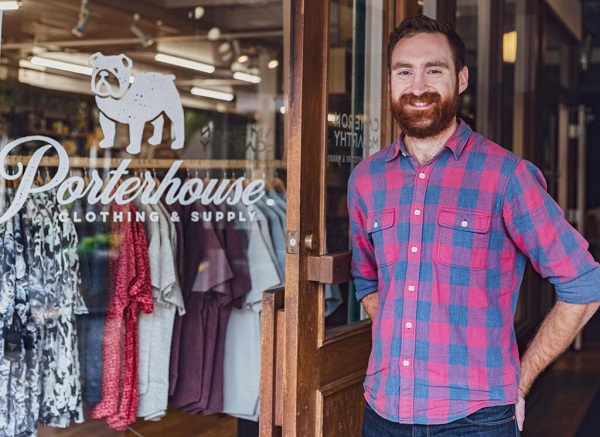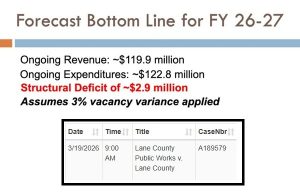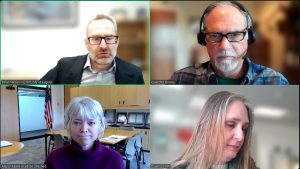Meet the Candidate: Ethan Clevenger
9 min read
This is Meet the Candidate, on KEPW News. Please tell us about yourself and why you’re running for City Council.
Ethan Clevenger: My name is Ethan Clevenger and I am a Ward 1 resident, believe it or not. My wife and I moved here in 2016. I was starting a web business and about late 2019, I had this crazy idea to open a retail menswear store, and I wanted to put it downtown.
[00:00:27] I am a big believer in downtown as a concept, and looking at the economics of a downtown, they’re a dense and impactful tax base. And so if your downtown is not thriving, as a city you will not thrive. And our downtown is not thriving.
[00:00:44] And so perhaps the craziest part of my plan was to put this business in Downtown Eugene as sort of making my stake and being able to take part in conversations around how we lead downtown.
[00:00:54] And COVID hit. That was a bummer, but we saw the plan through. You know, research that I had done into similar stores and similar demographic areas said, This is a good plan. So, saw it through COVID. Silver lining: We were able to get into a space we wouldn’t have otherwise considered. And that’s been a real, real awesome situation for us. And the store is still here today. I’m very excited about that.
[00:01:17] So I’ve been involved a lot in conversations about downtown and why it’s not thriving and it’s really no different than the conversations folks are having all across Eugene about homelessness and housing and public safety and, you know: Are parks accessible to everybody? Are our downtown sidewalks accessible to everybody?
[00:01:38] And I’ve taken some leadership positions in different organizations. I’m currently the president of Downtown Eugene Merchants, and I felt that running for City Council was a good next step for that. And when I saw in particular that the Eugene Chamber had elected not to endorse any of the current candidates for Ward 1, that signaled to me that something was maybe missing from what these two candidates were bringing to the table.
[00:02:03] I think Eugenians look at anyone who aligns themselves with business a little more critically than they look at perhaps your average folks. But the reality is, Broadway from High Street to Lincoln is lined with business owners. And they’re your neighbors and they’re out here and those are small boutique businesses, but we have other businesses too who are just as invested in local housing and public safety and solving homelessness.
[00:02:26] And they employ a lot of people too. They want it to be a place people want to live, because that’s how they succeed. So we all have the same goals and I think there’s sometimes a failure to recognize that. We equate anyone who runs a business with Sam Walton or something spooky like that. The reality is, those aren’t the local business owners in Eugene. They have the same goals as you and me.
[00:02:47] So here I am running for City Council to try and bridge that gap and get across those interest groups and maybe get some actual things done in a decisive way.
[00:02:55] We’re a city approaching 200,000 people. And I think we’ve been led like a city for a long time that is sitting at 50,000 people. And that just doesn’t scale. It’s not going to work. And we have to approach our governance style differently. So, here I am.
[00:03:10] John Q: What’s the most important issue facing Ward 1 this election? How would you address it?
[00:03:18] Ethan Clevenger: Yeah, it’s hard to address a single issue, right?
[00:03:23] The ones everybody’s going to talk about, and we all agree on these, right? Housing and homelessness, accessibility of our public spaces, the livability of our community, right? The stuff within the locus of control of the city.
[00:03:35] So we have the housing and homelessness piece, a lot of the other things get lifted when you solve that piece, right? So that’s what we have to be looking at. And there’s a lot of talk around the supply side. And I think that’s really good talk and we have to be making changes on the supply side to ensure that we’re building enough housing because we’re not. Typically, we’re not. You can’t make an argument against it unless you want to build a wall around Eugene.
[00:03:59] So we’re not building enough housing. We have to be able to do that. And we can’t just do that by continuing to develop grant and loan and deferral programs for developers. We have to engage with developers: ‘We don’t want to just keep throwing money at you. We want to understand why these projects don’t pencil out. What barriers can we drop that don’t necessarily cost us money as a city, right? But we can drop some barriers to make it make sense for you to build housing in Eugene.’
[00:04:20] And then of course, HB 2001 passes at the state level and that’s going to allow us to do some things around infill. And I think that’s a net good. That’s the supply side.
[00:04:31] And I do think we also have to look at the other side of it, which is that per the 2020 census, about one in five Eugenians is living at poverty level, as they define it. And that’s several percentage points higher than other, we’ll call them ‘up-and-coming mid-sized cities,’ and that’s not sustainable. We’re playing with one arm tied behind our back when we have people who, the housing is not accessible to them in any format, because they’re living at poverty levels.
[00:04:58] So that’s where you have to be looking, at the economic side of things, and: Are we creating good jobs in our community? Do people want to raise their families and live here? Are we giving people opportunities to not just get into low-income housing, right? That’s a great start to stabilize someone and get them on to the next thing.
[00:05:14] But ultimately we want them to graduate into housing that maybe they own, because that’s the single greatest piece of wealth in most Americans’ pocket, is the home that they own. It’s a huge deal for someone to own their own home and it gives you some autonomy.
[00:05:30] When you’re limited to low-income housing, or you’re not even limited to low-income housing, but maybe it’s just like whatever you can find that you can afford, there’s no autonomy there. You’re not in charge of your life. And that’s not—nobody wants to live like that.
[00:05:43] So the more we can do to also lift people out of poverty and lift people’s wages to make the housing that we have more accessible to them…
[00:05:51] Well, now we have a problem, that supply is way up here and the wages are way down here and we bring both of those pieces together and our market starts to feel a bit more right-sized.
[00:06:02] So, I think we have to approach it from both sides: We have to build a ton of housing, but we have to also look at that other piece because it has so many other impacts as well.
[00:06:09] John Q: If elected, what would you do differently than your opponents (who at the time of this interview, are Ted Coopman and Eliza Kashinsky)?
[00:06:20] Ethan Clevenger: And this is a question I try to answer in a particular way. I’ve met Eliza and I’ve met Ted, we’ve gotten together in different formats and I think there’s a commitment to not run a negative campaign. So how do we differentiate each other without disparaging each other?
[00:06:34] I’ll start with Ted. I think Ted is very, very good at a particular thing. And that is working within his neighborhood to get things done for that neighborhood. And he’s managed to do a lot of really great things over there around parks, around parking, and people appreciate him for that.
[00:06:51] And my concern is that that sort of grassroots thing, it was really great for solving those neighborhood-sized problems. But those aren’t the problems we’re facing at the city level. We’re facing big-city problems. And if we get mired down in figuring out, like, ‘Look, do we need a sidewalk repair budget?’ Sure. But we can’t have long conversations about that because we have other things we have to address. Fixing sidewalks is, like, you have people sleeping on the sidewalk. So you’re just kind of, like, making their bed better?
[00:07:21] So we can’t get mired down in those conversations. And we also can’t get mired down feeling like we have to appease everyone who walks in the room and speaks loudly at us, because at some point we are elected to lead. And that requires making hard decisions, right?
[00:07:38] And I think that also may differentiate me from Eliza. Eliza and I are going to support a lot of the same platforms, and we’re going to have a lot of the same opinions on things.
[00:07:48] And I think the difference is we need a candidate in office who, when somebody walks in with an absolute, says, ‘This is how it has to be,’ right? A small group of folks are very loud, they have signs and they say, ‘This is how it has to be. This is my absolute.’
[00:08:02] We have to be willing to say to them, ‘Look, I hear you. And I maybe even agree with you, but I have other folks I need to consider who have an absolute that’s different than yours, right? And I can’t do their thing either because those absolutes don’t work. But here’s a plan that I think is going to work toward fixing—like, you’re all in pursuit of solving a problem. Here’s something that isn’t quite what you’re after, it’s not quite what they’re after, but I think it’s in the middle, I think it’s going to move us in the right direction.’
[00:08:30] And we have to be willing to do that, to lead with that and run with that. And we can’t do that when we’re afraid of being recalled. We can’t do that when we’re afraid of everything being repealed. We have to be a community that moves forward on things. We can’t litigate state legislation at the city level, right? But that’s what we get tied up doing.
[00:08:49] Yeah, so I think that is what differentiates me from my two opponents is the level of pragmatism that I think City Council is going to require—a level of pragmatism, decisiveness and leadership and not simply trying to appease everyone who walks in the room.
[00:09:02] John Q: Is there anything else you’d like to say to the voters? And how can people get involved in your campaign?
[00:09:11] Ethan Clevenger: Oh, my gosh. You know, Ward 1 is historically a competitive ward and it’s a ward with fairly good turnout. And I think that’s something that I love about it. I’m a big get-out-the-vote guy. I’m a big volume guy and Oregon makes that so easy to do.
[00:09:24] So, what I would say is to make sure that you do get out and vote. And vote downballot, because obviously, come the primary, we’re going to have, it’s a presidential year, so people want to vote for that.
[00:09:34] But we have a really competitive mayor’s race that deserves everyone’s attention. We have a Ward 1 race that deserves everyone’s attention. So I look forward to engaging with folks and helping them make an informed decision in May.
[00:09:45] And yeah, so my inbox is always open, I can be reached at Campaign@EthanForEugene.com, that comes directly to me. And of course our website, EthanForEugene.com, I’ve gone to some depth on there about my platforms without (hopefully) being professorial.
[00:10:02] Your friendly neighborhood Act Blue link can be found on our website and we would appreciate your support via donations, via canvassing, you can find all that information on the website.
[00:10:12] John Q: Ward 1 candidate Ethan Clevenger. You can contact him through the website EthanForEugene.com.





